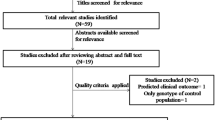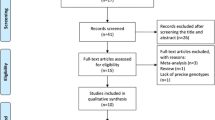Abstract
The X-ray repair cross-complementation group 1 (XRCC1) gene plays an important role in base excision repair pathway. Several studies have reported contradictory results for XRCC1 exon 10 (Arg399Gln, G23990A, rs25487) gene polymorphism and cancer risk in Indian population, making it difficult to interpret them. Therefore, we have conducted a meta-analysis to evaluate the more precise association between XRCC1 exon 10 G>A gene polymorphism and risk of cancer by published studies. We searched PubMed (Medline) and Google scholar web databases to cover all studies published on association between XRCC1 exon 10 G>A gene polymorphism and cancer risk until August 2016. Pooled odds ratios (ORs) and 95% confidence intervals (95% CIs) were used to appraise the strength of association. Heterogeneity, publication bias and sensitivity analysis were also assessed. Twenty-five published studies had fulfilled the inclusion criteria comprising 4131 confirmed cancer cases and 5013 controls. When all studies were polled together, overall significant association was found between XRCC1 exon 10 G>A polymorphism and cancer risk in variant allele carrier (A vs. G: OR 1.217, 95% CI 1.056–1.402, p = 0.007), homozygous (AA vs. GG: OR 1.359, 95% CI 1.036–1.783, p = 0.027), dominant (AA+AG vs. GG OR 1.208, 95% CI 1.006–1.450, p = 0.043) and recessive (AA vs. AG+GG: OR 1.315, 95% CI 1.029–1.680, p = 0.029) genetic models. Further sensitivity analysis supported the stability of our result by showing similar ORs before and after removal of a single study. The present meta-analysis suggested that the XRCC1 exon 10 G>A polymorphism contribute cancer risk in Indian population, and supports that individuals with risk allele A and AA genotype are at higher risk of developing cancer.







Similar content being viewed by others
References
Siegel RL, Miller KD, Jemal A. Cancer statistics, 2015. CA Cancer J Clin. 2015;65:5–29.
Takiar R, Nadayil D, Nandakumar A. Projections of number of cancer cases in India (2010–2020) by cancer groups. Asian Pac J Cancer Prev. 2010;11:1045–9.
Pharoah PD, Dunning AM, Ponder BA, Easton DF. Association studies for finding cancer susceptibility genetic variants. Nat Rev Cancer. 2004;4:850–60.
Chung CC, Magalhaes WC, Gonzalez-Bosquet J, Chanock SJ. Genome-wide association studies in cancer–current and future directions. Carcinogenesis. 2010;31:111–20.
Friedberg EC. DNA damage and repair. Nature. 2003;421:436–40.
Ishikawa T, Ide F, Qin X, Zhang S, Takahashi Y, Sekiguchi M. Importance of DNA repair in carcinogenesis: evidence from transgenic and gene targeting studies. Mutat Res. 2001;477:41–9.
Marsin S, Vidal AE, Sossou M, Ménissier-de Murcia J, Le Page F, Boiteux S. Role of XRCC1 in the coordination and stimulation of oxidative DNA damage repair initiated by the DNA glycosylase hOGG1. J Biol Chem. 2003;278:44068–74.
Caldecott KW, Aoufouchi S, Johnson P, Shall S. XRCC1 polypeptide interacts with DNA polymerase beta and possibly poly (ADP-ribose) polymerase, and DNA ligase III is a novel molecular ‘nick-sensor’ in vitro. Nucleic Acids Res. 1996;24:4387–94.
Duell EJ, Wiencke JK, Cheng TJ, Varkonyi A, Zuo ZF, Ashok TD. Polymorphisms in the DNA repair genes XRCC1 and ERCC2 and biomarkers of DNA damage in human blood mononuclear cells. Carcinogenesis. 2000;21:965–71.
Ghosh S, Ghosh S, Bankura B. Association of DNA repair and xenobiotic pathway gene polymorphisms with genetic susceptibility to gastric cancer patients in West Bengal, India. Tumour Biol. 2016;37:9139–49.
Bajpai D, Banerjee A, Pathak S, Thakur B, Jain SK, Singh N. Single nucleotide polymorphisms in the DNA repair genes in HPV-positive cervical cancer. Eur J Cancer Prev. 2016;25:224–31.
Saikia BJ, Phukan RK, Sharma SK, Sekhon GS, Mahanta J. Interaction of XRCC1 and XPD gene polymorphisms with lifestyle and environmental factors regarding susceptibility to lung cancer in a high incidence population in North East India. Asian Pac J Cancer Prev. 2014;15:1993–9.
Choudhury JH, Choudhury B, Kundu S, Ghosh SK. Combined effect of tobacco and DNA repair genes polymorphisms of XRCC1 and XRCC2 influence high risk of head and neck squamous cell carcinoma in northeast Indian population. Med Oncol. 2014;31:67.
Uppal V, Mehndiratta M, Mohapatra D, Grover RK, Puri D. XRCC-1 Gene Polymorphism (Arg399Gln) and Susceptibility to Development of Lung Cancer in Cohort of North Indian Population: A Pilot Study. J Clin Diagn Res. 2014;8:CC17–20.
Natukula K, Jamil K, Pingali UR, Attili VS, Madireddy UR. The codon 399 Arg/Gln XRCC1 polymorphism is associated with lung cancer in Indians. Asian Pac J Cancer Prev. 2003;14:5275–9.
Devi MS, Balachandar V, Arun M. Analysis of genetic damage and gene polymorphism in hepatocellular carcinoma (HCC) patients in a South Indian population. Dig Dis Sci. 2013;58:759–67.
Bose S, Tripathi DM. Sukriti. Genetic polymorphisms of CYP2E1 and DNA repair genes HOGG1 and XRCC1: association with hepatitis B related advanced liver disease and cancer. Gene. 2013;519:231–7.
Annamaneni S, Gorre M, Kagita S. Association of XRCC1 gene polymorphisms with chronic myeloid leukemia in the population of Andhra Pradesh. India Hematol. 2013;18:163–8.
Khan NP, Pandith AA, Yousuf A. The XRCC1 Arg399Gln gene polymorphism and risk of colorectal cancer: a study in Kashmir. Asian Pac J Cancer Prev. 2013;14:6779–82.
Nissar S, Lone TA, Banday MZ. Arg399Gln polymorphism of XRCC1 gene and risk of colorectal cancer in Kashmir: a case control study. Oncol Lett. 2013;5:959–63.
Berhane N, Sobti RC, Mahdi SA. DNA repair genes polymorphism (XPG and XRCC1) and association of prostate cancer in a north Indian population. Mol Biol Rep. 2012;39:2471–9.
Kumar A, Pant MC, Singh HS, Khandelwal S. Associated risk of XRCC1 and XPD cross talk and life style factors in progression of head and neck cancer in north Indian population. Mutat Res. 2012;729:24–34.
Mittal RD, Mandal RK, Gangwar R. Base excision repair pathway genes polymorphism in prostate and bladder cancer risk in North Indian population. Mech Ageing Dev. 2012;133:127–32.
Wang J, Zhao Y, Jiang J. Polymorphisms in DNA repair genes XRCC1, XRCC3 and XPD, and colorectal cancer risk: a case-control study in an Indian population. J Cancer Res Clin Oncol. 2010;136:1517–25.
Srivastava A, Srivastava K, Pandey SN, Choudhuri G, Mittal B. Single-nucleotide polymorphisms of DNA repair genes OGG1 and XRCC1: association with gallbladder cancer in North Indian population. Ann Surg Oncol. 2009;16:1695–703.
Syamala VS, Syamala V, Sreedharan H, Raveendran PB, Kuttan R, Ankathil R. Contribution of XPD (Lys751Gln) and XRCC1 (Arg399Gln) polymorphisms in familial and sporadic breast cancer predisposition and survival: an Indian report. Pathol Oncol Res. 2009;15:389–97.
Kiran M, Saxena R, Chawla YK, Kaur J. Polymorphism of DNA repair gene XRCC1 and hepatitis-related hepatocellular carcinoma risk in Indian population. Mol Cell Biochem. 2009;327:7–13.
Mitra AK, Singh N, Singh A. Association of polymorphisms in base excision repair genes with the risk of breast cancer: a case-control study in North Indian women. Oncol Res. 2008;17:127–35.
Sreeja L, Syamala VS, Syamala V. Prognostic importance of DNA repair gene polymorphisms of XRCC1 Arg399Gln and XPD Lys751Gln in lung cancer patients from India. J Cancer Res Clin Oncol. 2008;134:645–52.
Sobti RC, Singh J, Kaur P. XRCC1 codon 399 and ERCC2 codon 751 polymorphism, smoking, and drinking and risk of esophageal squamous cell carcinoma in a North Indian population. Cancer Genet Cytogenet. 2007;175:91–7.
Pachouri SS, Sobti RC, Kaur P, Singh J. Contrasting impact of DNA repair gene XRCC1 polymorphisms Arg399Gln and Arg194Trp on the risk of lung cancer in the north-Indian population. DNA Cell Biol. 2007;26:186–91.
Ramachandran S, Ramadas K, Hariharan R. Single nucleotide polymorphisms of DNA repair genes XRCC1 and XPD and its molecular mapping in Indian oral cancer. Oral Oncol. 2006;42:350–62.
Joseph T, Kusumakumary P, Chacko P, Abraham A, Pillai MR. DNA repair gene XRCC1 polymorphisms in childhood acute lymphoblastic leukemia. Cancer Lett. 2005;217:17–24.
Chacko P, Rajan B, Joseph T, Mathew BS, Pillai MR. Polymorphisms in DNA repair gene XRCC1 and increased genetic susceptibility to breast cancer. Breast Cancer Res Treat. 2005;89:15–21.
Wu R, Li B. A multiplicative-epistatic model for analyzing interspecific differences in outcrossing species. Biometrics. 2009;55:355–65.
Mantel N, Haenszel W. Statistical aspects of the analysis of data from retrospective studies of disease. J Natl Cancer Inst. 1959;22:719–48.
DerSimonian R, Laird N. Meta-analysis in clinical trials. Control Clin Trials. 1986;7:177–8.
Egger M, Davey Smith G, Schneider M, Minder C. Bias in meta-analysis detected by a simple, graphical test. BMJ. 1997;315:629–34.
Wetterslev J, Thorlund K, Brok J. Trial sequential analysis may establish when firm evidence is reached in cumulative metaanalysis. J Clin Epidemiol. 2008;61:64–75.
Turner RM, Bird SM, Higgins JP. The impact of study size on metaanalyses: examination of underpowered studies in Cochrane reviews. PLoS ONE. 2013;8:e59202.
Brok J, Thorlund K, Wetterslev J. Apparently conclusive metaanalyses may be inconclusive—Trial sequential analysis adjustment of random error risk due to repetitive testing of accumulating data in apparently conclusive neonatal meta-analyses. Int J Epidemiol. 2009;38:287–8.
Khoury MJ, Yang Q. The future of genetic studies of complex human diseases: an epidemiologic perspective. Epidemiology. 1998;9:350–4.
Tebbs RS, Flannery ML, Meneses JJ, Hartmann A, Tucker JD, Thompson LH. Requirement for the Xrcc1 DNA base excision repair gene during early mouse development. Dev Biol. 1999;208:513–29.
Whitehouse CJ, Taylor RM, Thistlethwaite A. XRCC1 stimulates human polynucleotide kinase activity at damaged DNA termini and accelerates DNA single-strand break repair. Cell. 2001;104:107–17.
Munafò MR, Flint J. Meta-analysis of genetic association studies. Trends Genet. 2004;20:439–44.
Li Y, Marion MJ, Rundle A, Brandt-Rauf PW. A common polymorphism in XRCC1 as a biomarker of susceptibility for chemically induced genetic damage. Biomarkers. 2003;8:408–14.
Brem R, Hall J. XRCC1 is required for DNA single-strand break repair in human cells. Nucleic Acids Res. 2005;33:2512–20.
Indian Genome Variation Consortium. Genetic landscape of the people of India: a canvas for disease gene exploration. J Genet. 2008;87:3–20.
Author information
Authors and Affiliations
Corresponding author
Ethics declarations
Conflict of interest
Authors declare that they have no conflict of interest.
Rights and permissions
About this article
Cite this article
Mandal, R.K., Mittal, R.D. Genetic Variant Arg399Gln G>A of XRCC1 DNA Repair Gene Enhanced Cancer Risk Among Indian Population: Evidence from Meta-analysis and Trial Sequence Analyses. Ind J Clin Biochem 33, 262–272 (2018). https://doi.org/10.1007/s12291-017-0669-y
Received:
Accepted:
Published:
Issue Date:
DOI: https://doi.org/10.1007/s12291-017-0669-y




